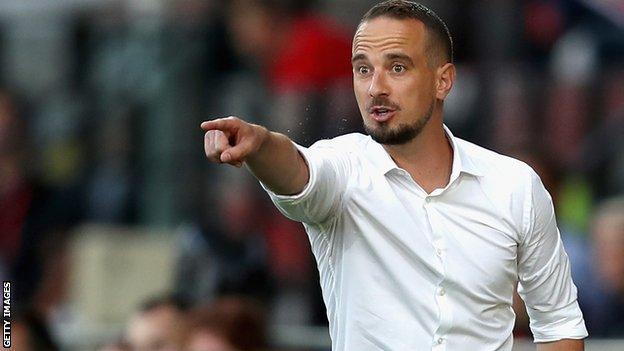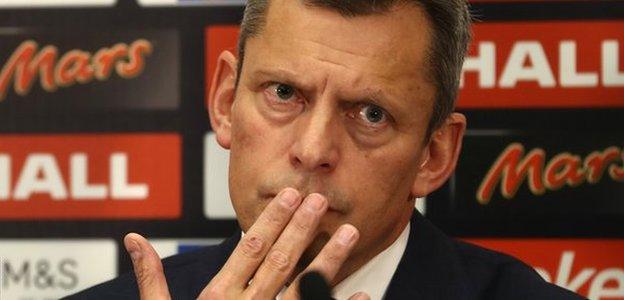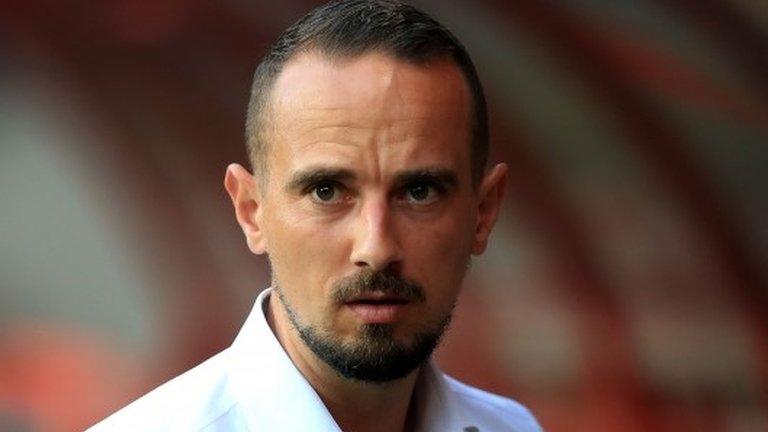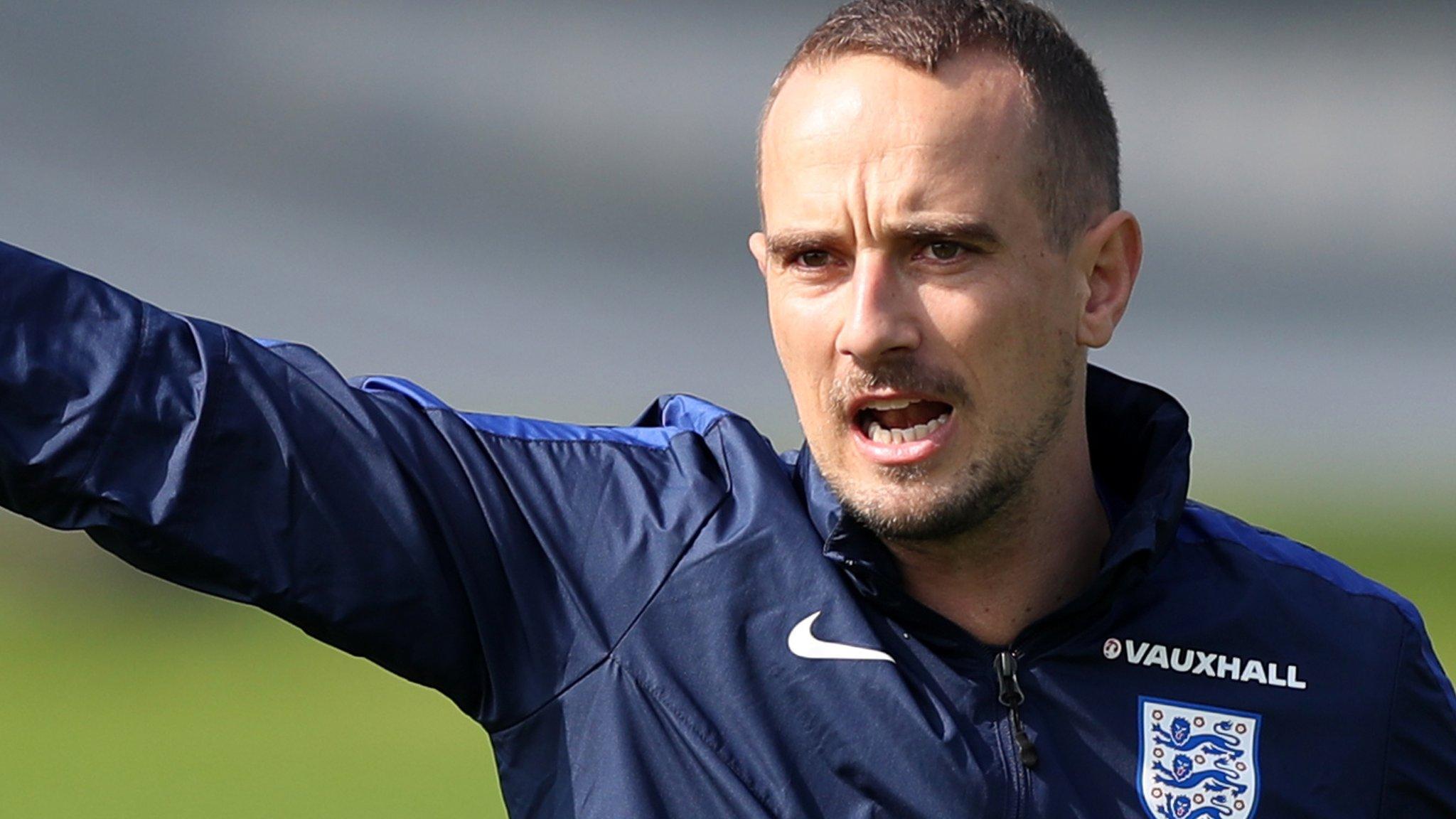Mark Sampson: Questions facing FA after sacking of England women's boss
- Published
FA chief executive Martin Glenn explains Sampson sacking
Football Association crises occur with such regularity that they no longer come as any surprise.
From chronically failing England teams and all-too-regular managerial sackings to painfully slow governance reforms and the appalling child sex abuse scandal that erupted last year, the governing body seems to lurch from one controversy to the next, despite being in receipt of tens of millions of pounds of public money, and regular changes of chairmen and chief executives.
But even by the FA's standards, its handling of the Mark Sampson affair is the worst many can recall.
Regardless of the sensitivities and complexities surrounding the England women manager's sacking - when reporters are given only two hours to reach Wembley for a crucial briefing with the chief executive and chairman, ensuring several of the most influential sports journalists in the country cannot attend - it suggests panic has set in.
And when national newspapers start calling for the head of the chief executive amid what the sports minister describes as "a mess", the sense is that the FA is in danger of losing control.
Sampson may have been dismissed, but this is not going away. Next month, FA executives will be summoned to explain themselves to the Culture, Media and Sport parliamentary select committee. So what questions will they be asked? Here are just a few they can expect to face.

Mark Sampson was appointed England women's manager in December 2013
1. What exactly was it that Sampson did with female players at the Bristol Academy, and why was he cleared by a panel of safeguarding experts, yet, years later, was suddenly deemed unfit to work for the FA?
Was this just a cynical piece of opportunism and political expediency? A convenient way for the FA to get rid of an under-fire employee under mounting pressure over the Eni Aluko allegations, but who could not be dismissed because he had been cleared by two potentially flawed investigations?
The FA insists not, but some in the game are uneasy with how this all looks, and Sampson's next move will be fascinating. Might he take legal action? All will be revealed.

Glenn will face questioning from MPs
2. Did those in charge of Sampson's recruitment - current FA technical director Dan Ashworth and participation director Kelly Simmons, along with former colleagues Sir Trevor Brooking and Adrian Bevington - fail to carry out sufficient due diligence, or ensure the FA's HR department did so?
After all, this was a male coach of the England women's team, a very senior role that carries significant responsibilities. Or were warning signs missed?
Some England players past and present have told the BBC they were fully aware of rumours about Sampson's relationships with players before he became England boss. Women in Football goes further, saying the FA was made fully aware of allegations before Sampson's appointment. But those involved in his recruitment deny this. So what is the truth?
Does this smack of negligence and a lack of interest in the women's game? Or something worse? A year after Sam Allardyce lost his job one match into his tenure as England men's manager, the FA's recruitment and selection is once again under fierce scrutiny.
Some people in the women's game have suggested that in the semi-professional world of women's football, relationships between players and coaches are not unusual, and that this wider context should be taken into account when judging the decisions taken when Sampson was hired - and then cleared.
However, as the Women's Sports Trust said on Thursday: "With growth and increased profile comes greater scrutiny."
It will be interesting to hear what Sampson's former players at the Bristol Academy have to say if any break rank and talk to the media in the coming days.

England's last campaign under Sampson - in Euro 2017 - ended in the semi-finals
3. Once the safeguarding investigation was completed in March 2015, why was Sampson not then dismissed given the responsibilities of his role?
He may not have been deemed a risk working in the game, but we now know his behaviour was serious enough to warrant being placed on an FA behaviour development and mentoring course that explained to him the professional boundaries that exist between player and coach.
The FA makes the point that this all happened long before the child sex abuse scandal at the end of last year when safeguarding issues were not as prominent and, were it to occur now, he would be sacked. But is this a good enough explanation?
Sampson's behaviour was not illegal - it did not even break any of football's rules - but it so obviously raised serious issues of potential abuse of power, and the risk of favouritism in selection, that it will seem shocking to many that he was allowed to remain in post once the details of his actions became known in 2015.
4. Can FA chief executive Martin Glenn keep his job?
MPs will ask him why - when he was made aware of the investigation in October 2015 - did he not ask to see the full report until last week. Glenn is highly regarded at the FA but, having admitted last year that he is "not a footballing expert", before leading (along with Ashworth and vice-chairman David Gill) the ill-fated recruitment of Allardyce, he is under pressure.
He is said by FA insiders to retain the full support of the board, but his lack of curiosity over the Sampson case has raised eyebrows. Ashworth was also aware of the safeguarding investigation but, like his boss Glenn, appears to have felt that the confidential nature of the inquiry precluded asking to see the full report.
More recently, it will no doubt surprise many that Sampson was allowed to oversee England's win over Russia on Tuesday night, even though a decision to sack him was effectively made over the weekend.
Will it upset some of those players who, unaware of that decision, made a very public show of support for their then-manager during the match?
I'm not a racist - Sampson
5. Was the safeguarding inquiry flagged up to the two subsequent investigations into Aluko's allegations against Sampson? Could it have made a difference to the outcome of either? Should there be an entirely new inquiry headed up by a new independent investigator?
The FA was already under pressure over their handling of the Aluko saga after failing to interview a key witness, Aluko's Chelsea team-mate Drew Spence. It insists these two matters are separate, but those calls will only intensify now the details of this earlier Sampson controversy have emerged. Why did they pay Aluko £80,000, despite her claims not being upheld in either investigation? Was it to avoid the disruption of an employment tribunal, as they claim? Or was it to keep the embarrassing details of Sampson's safeguarding controversy secret? And when Aluko made her allegations, why on earth did the alarm bells not ring, and Glenn, or Ashworth, or anyone, think to inquire further about why he Sampson had already been under investigation a year previously?
Eniola Aluko spoke to the BBC about Sampson claims in August
The FA says it is striving to modernise and be more transparent and point to the advances in the women's game, new investment in grassroots facilities, governance reforms, St George's Park, and the success of England's youth teams this summer as proof of progress.
But its handling of this latest crisis will do little to restore faith in those who govern the national sport.
- Published21 September 2017

- Published20 September 2017
